In 2009, under the auspices of the Peking University–Yale University Joint Undergraduate Program, Professor Alastair Minnis made his first visit to Peking University. Sixteen years later, this scholar of global renown in medieval studies, who has “long held PKU dear,” returned to deliver five profoundly engaging lectures, guiding the audience through the intricate tapestry of medieval culture and intellectual life.
At the invitation of the Department of English, School of Foreign Languages, Peking University, and with the support of the PKU Global Fellowship under the Distinguished Scholars Lecture Series, Professor Alastair Minnis — Douglas Tracy Smith Professor of English at Yale University, Honorary Fellow of the English Association (UK), and Fellow of the Royal Irish Academy — visited PKU to deliver this series of lectures.
Beginning with Negotiations of Authority and concluding with The Appeal to “Authenticity”, the lectures traced a progressive intellectual trajectory, examining the dynamics of textual authority, theological reasoning, perceptions of the body, medical discourse, and literary theory. Along with three in-depth sessions featuring discussants’ responses and thematic engagements, the series offered audiences a richly layered understanding of the intellectual and cultural landscape of medieval Europe.
The lecture series was organized by the School of Foreign Languages at Peking University with the support of the Office of International Relations of Peking University. The sessions were chaired by Professor Hai Na, Head of the Department of English at Peking University, and Professor Yun Ni of the Department of English at Peking University. Discussants included Professors Fengfeng Gao and Yun Ni from the Department of English, Peking University, and Professor Huiyi Bao from Fudan University. The series attracted several hundred faculty members and students, whose active participation and thoughtful questions contributed to a dynamic, collegial, and intellectually stimulating scholarly exchange.
Lecture 1: Negotiations of Authority: The Story of Textual Commentary in Late-Medieval Western Europe
In the opening lecture, Professor Minnis focused on the tradition of textual commentary in late-medieval Western Europe, examining how the rise of scholasticism endowed medieval literature with new intellectual resources. He analyzed the adaptation of Latin classical commentaries into vernacular literature through the works of literary giants such as Boccaccio and Dante, revealing the cultural tensions underpinning literary production. Through a rigorous engagement with literature, philosophy, history, and manuscript studies, Professor Minnis demonstrated how literary innovation sparked intellectual debate. This approach traced the interplay of ideas across disciplines, illuminating how medieval literary innovation shaped global intellectual history and continues to inform contemporary cultural production.
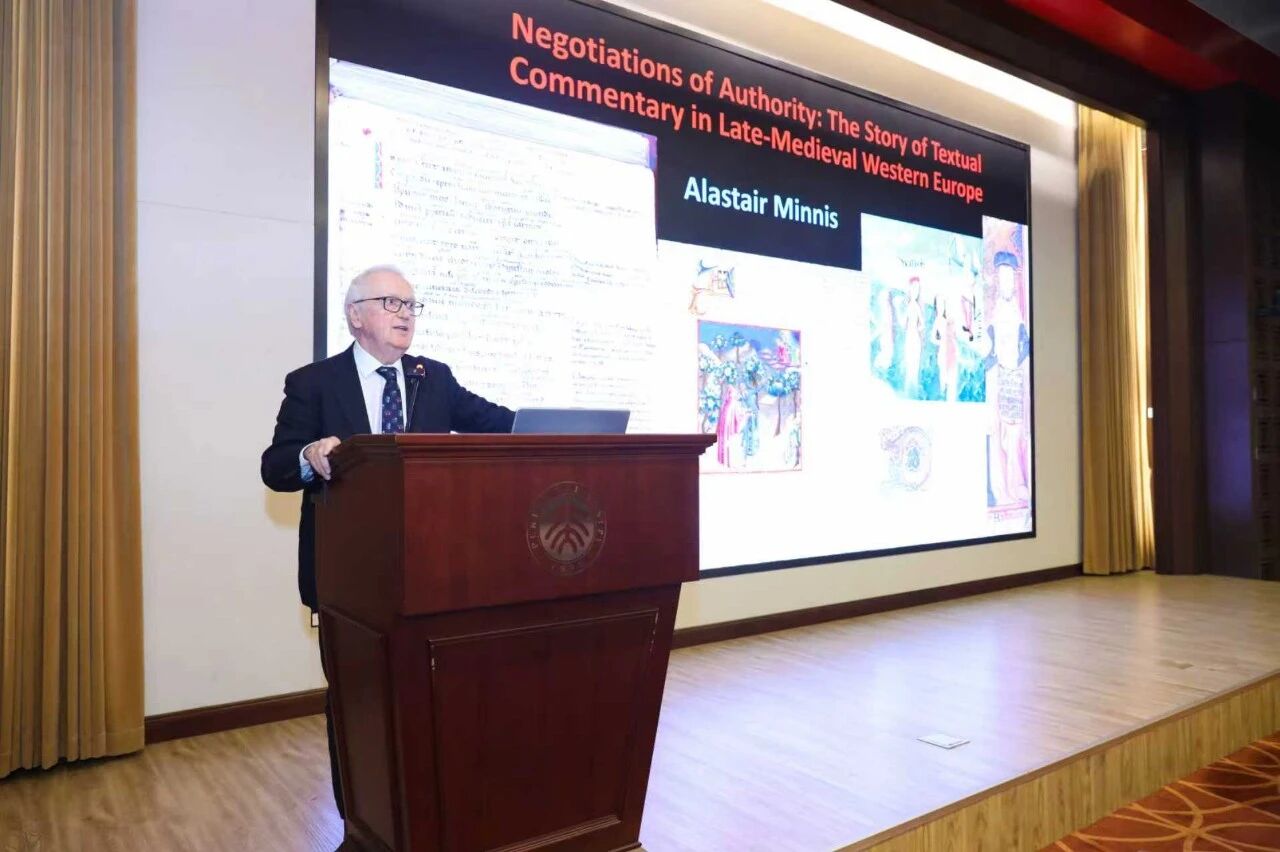
Professor Alastair Minnis Delivering the Opening Lecture at Peking University
During the discussion session, Professor Fengfeng Gao of the Department of English engaged with Professor Minnis’s established theory on the formation of authority and authorship in medieval literature, approaching these issues through the lenses of biblical interpretation and the reception of classical traditions. He lauded the scholarly significance of Professor Minnis’s research on the tradition of commentary and highlighted the enduring vitality of the self-commentary tradition initiated by Dante, noting its recurrence in later works by figures such as Alexander Pope in the eighteenth century. In the subsequent Q&A session, faculty members and students actively posed questions regarding Dante’s identity as a vernacular poet, the function of self-commentary, and the authority of medieval female authors, fostering lively and highly interactive scholarly dialogue.
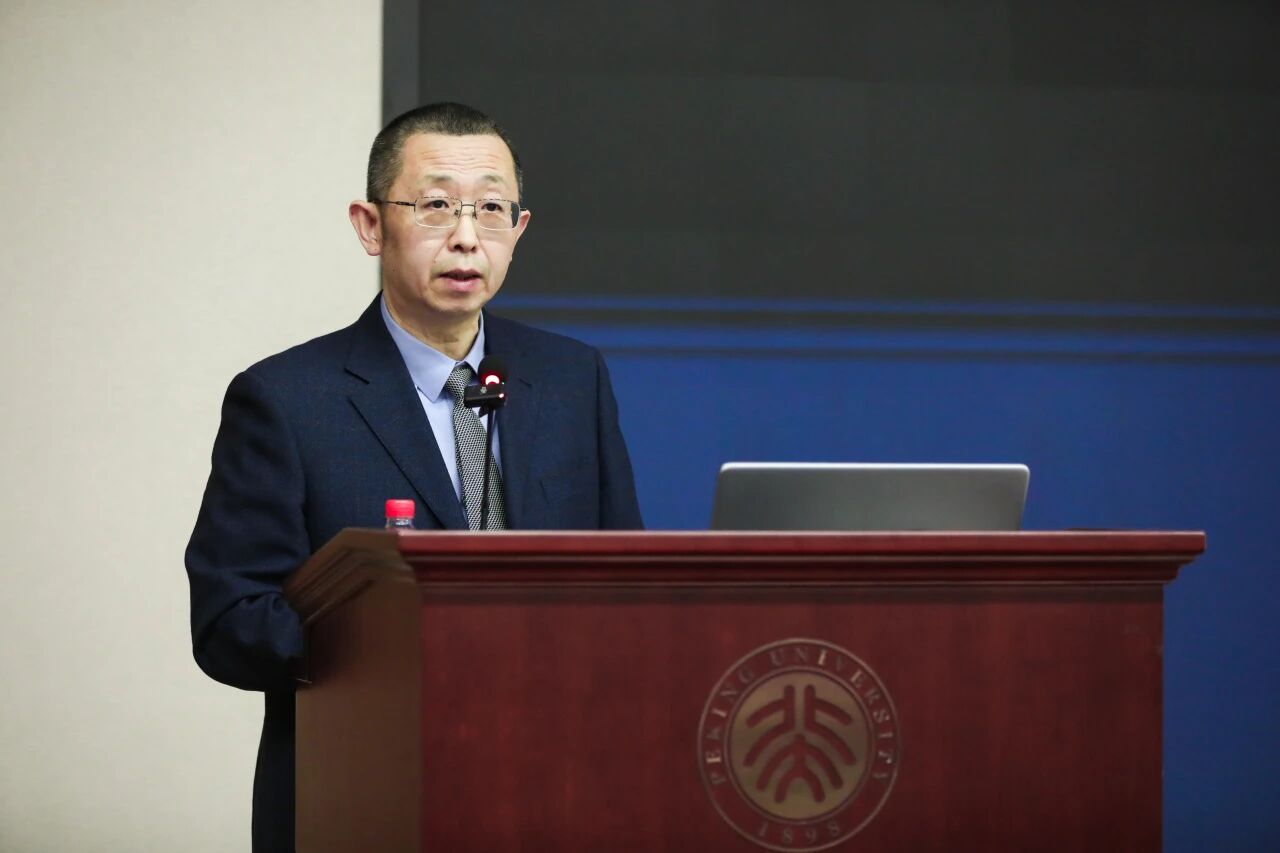
Professor Fengfeng Gao, Discussant
Lecture 2: Justifying Pain and Punishment: The Struggle of Medieval Theologians
In the second lecture, Professor Minnis examined the sacredness of physical suffering, the complex dual role of pain in medieval theology, and the evolution of narratives of divine suffering. Through careful textual analysis and theoretical exposition, he traced the intellectual trajectory of medieval theologians and highlighted the internal tensions they faced in reconciling divine justice with human suffering. Professor Minnis further explored the interplay between cultural frameworks and ethical values, revealing not only the social psychology and power structures of the Middle Ages but also offering insights applicable to contemporary social and cultural governance.
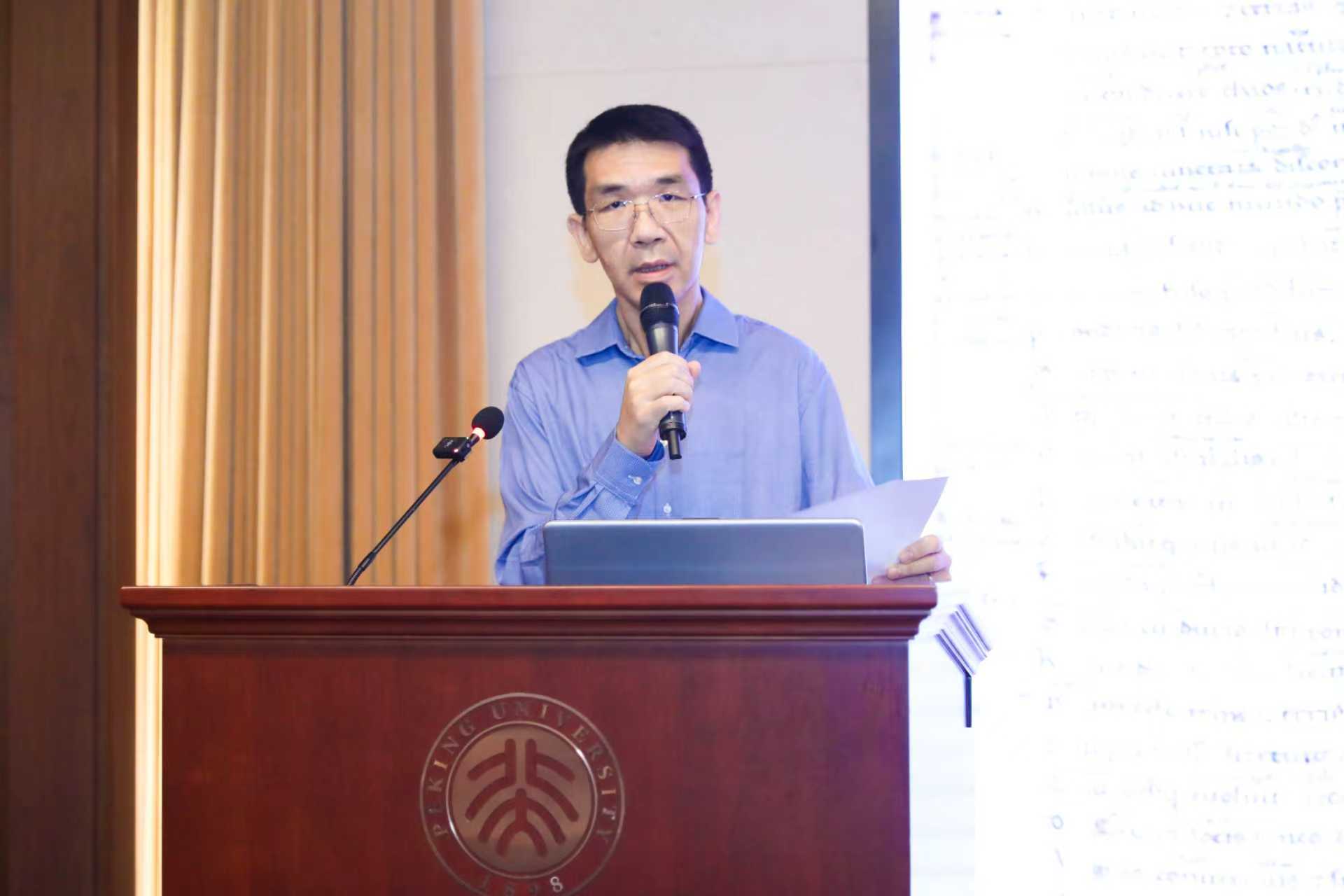
Professor Hai Na Chairing the Discussion
Lecture 3: Phantomology: From Soul to Brain — Medieval Studies Meets Neuroscience
“Why does pain remain real when the limb is no longer there?” Beginning with this intriguing phenomenon, Professor Minnis guided the audience on an intellectual journey spanning philosophy, theology, and neuroscience. He systematically traced the theoretical parallels between medieval theological thought and modern neuroscience in accounting for “sensation without a body,” highlighting how research on phantom limb pain demonstrates that the brain’s constructed model of the body can generate genuine pain experiences — a notion that resonates across centuries with medieval debates on whether the soul could experience pain after death. Approaching the question from a perspective that creatively bridges the humanities and the natural sciences, Professor Minnis prompted profound reflections on the mind-body relationship. In this lecture, cutting-edge scientific discoveries and enduring humanistic traditions converged, together offering compelling insights into the study of human cognition.
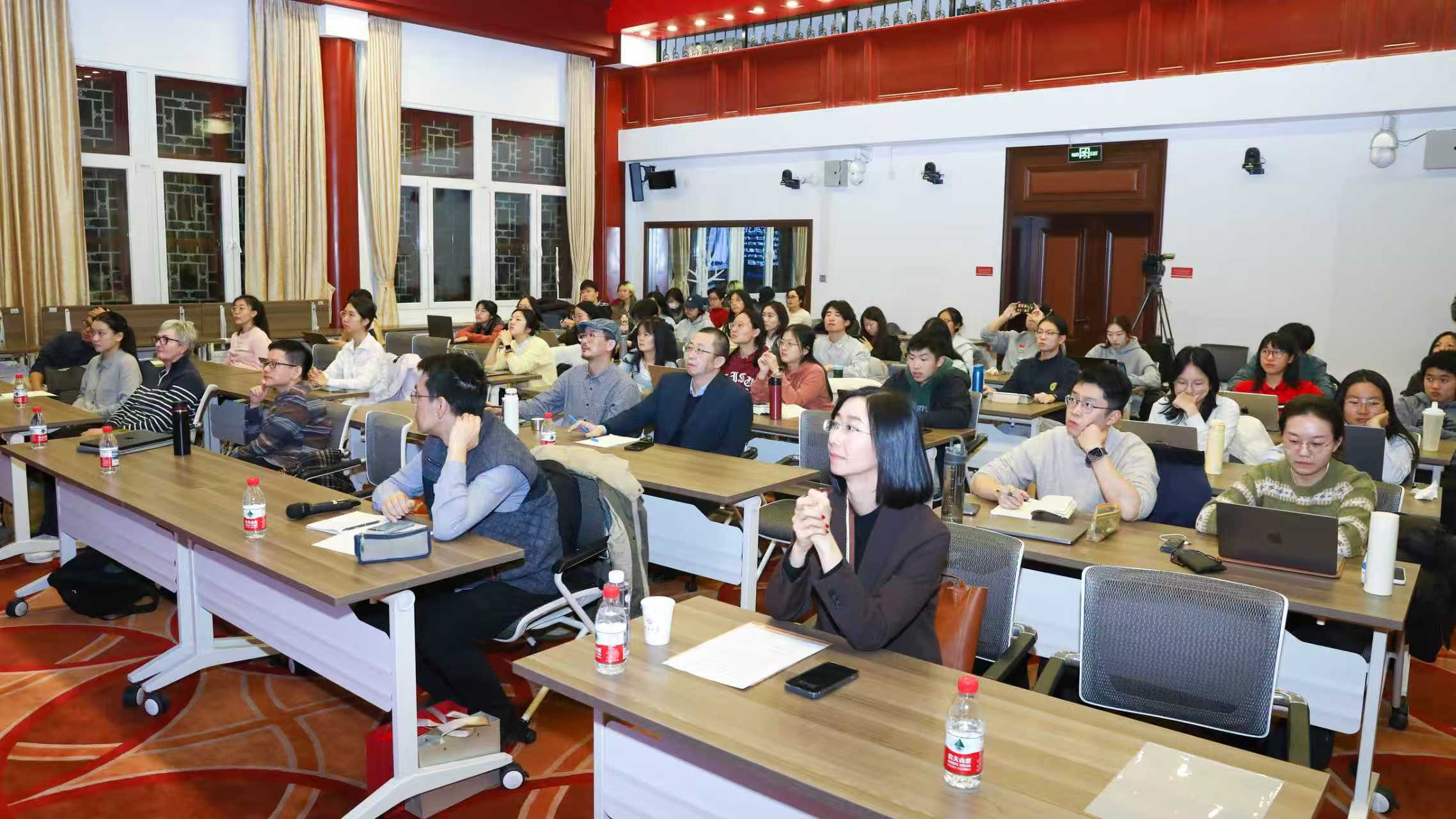
On Site at the Event
Lecture 4: Proto-surgery, Race, and Resurrection: A Medieval “Leg Transplant” Miracle
Focusing on the medieval miracle narrative of leg transplantation — specifically, the story of a Black leg transplanted onto a white body — Professor Minnis systematically analyzed its representations and transformations in culture and art from both synchronic and diachronic perspectives, closely examining the contestations over the body among culture, faith, and power. He began by elucidating how this legend reflected medieval understandings of bodily and ethnic difference, medical discourse, and, ultimately, resurrection theology. Drawing on W. E. B. Du Bois’s insights into the interaction between Black bodies and religious discourse, Professor Minnis explored the connections and tensions between theological claims and actual racial practices.
In the second part of the lecture, Professor Minnis examined artistic adaptations of this transplant miracle in later periods, tracing representations of the Black figure in literature and art from the Renaissance to the modern era. Viewed diachronically, the legend revealed rich socio-historical significance. Through this micro-case study, Professor Minnis demonstrated the interpretive power of cultural studies to connect past and present while revealing the interplay of power, belief, and social identity across history. The lecture provided audiences with a lens for examining enduring issues of the body, race, and power, highlighting the persistence of social and cultural structures over time and offering historical perspectives relevant to contemporary social challenges.
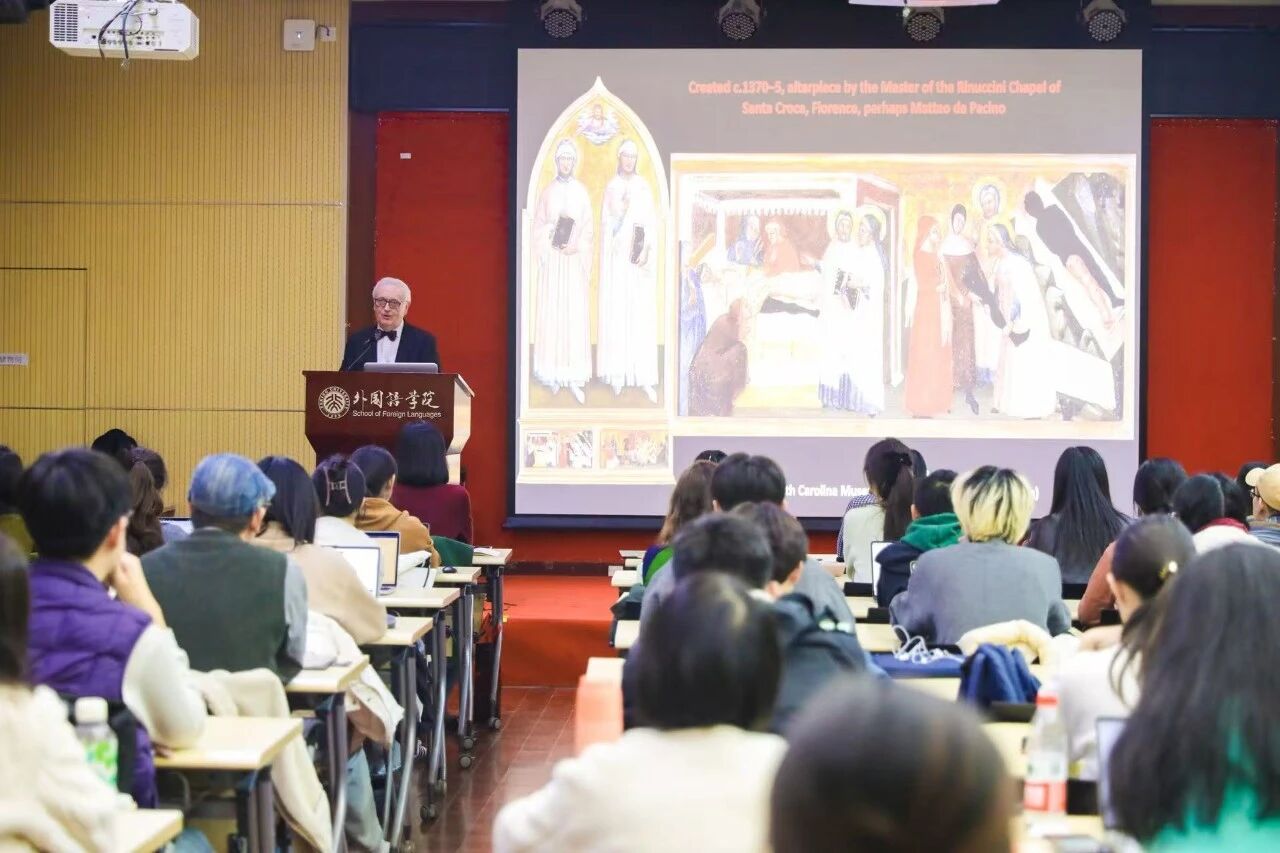
Professor Minnis Giving the Fourth Lecture in the Series
During the discussion session, Professor Huiyi Bao from Fudan University engaged Professor Minnis in a multifaceted dialogue. She began by noting that his analysis offered profound insights into medieval conceptions of the body, then drew a striking comparison between the transplant miracle and passages in Flaubert’s Madame Bovary to illuminate the contrasts between medieval and modern understandings of embodiment. Professor Bao further enriched the discussion through comparisons with Dante’s Divine Comedy, deepening reflections on bodily integrity. She also highlighted the nuanced interplay between the lecture’s iconography and contemporary perspectives on race, emphasizing its continued relevance to modern racial discourse. In the ensuing exchange, faculty and students raised thoughtful questions concerning self and other, the boundaries of the body, and racialized violence within theological contexts, to which Professor Minnis responded with his characteristic incisiveness and discerning insight.
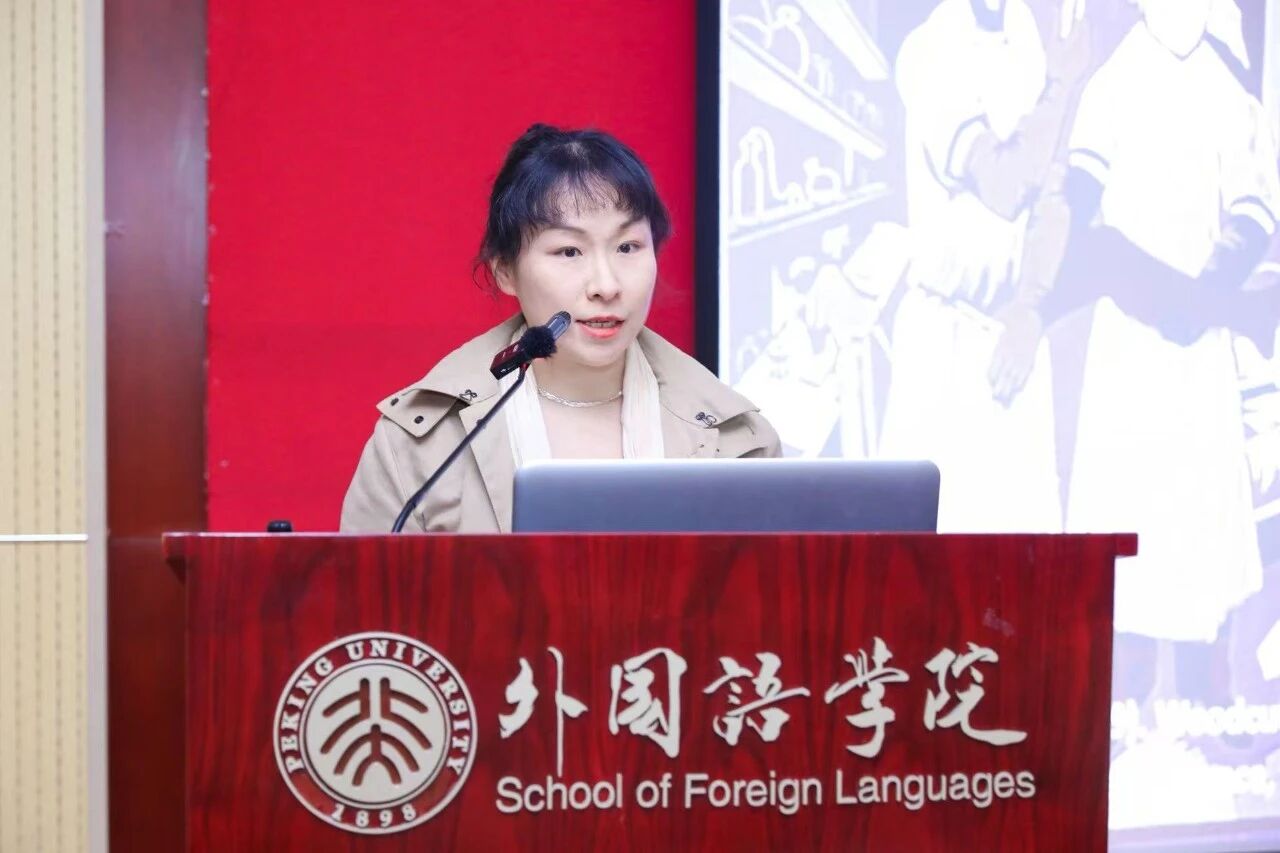
Professor Huiyi Bao, Discussant
Lecture 5: The Appeal to “Authenticity” in Medieval Western Literature
In his concluding lecture, Professor Minnis turned to the concept of “authenticity,” a central motif in literature. He traced its evolution across the intersecting spheres of theological authority, shared moral frameworks, and historical transmission, demonstrating its enduring relevance in the modern world. In his meticulous and nuanced analysis, he charted the scholarly origins of the term, unpacked its layered significance in the medieval period, and traced its transformation over the centuries. Drawing on literature, theology, and philosophy, Professor Minnis reconstructed a conceptual genealogy that revealed the interplay of ideas across disciplines and historical contexts. His presentation illuminated the cultural and intellectual significance of “authenticity,” enabling the audience to discern the enduring social and psychological currents shaping contemporary life while fostering a deeper appreciation for the lasting allure of cultural history.
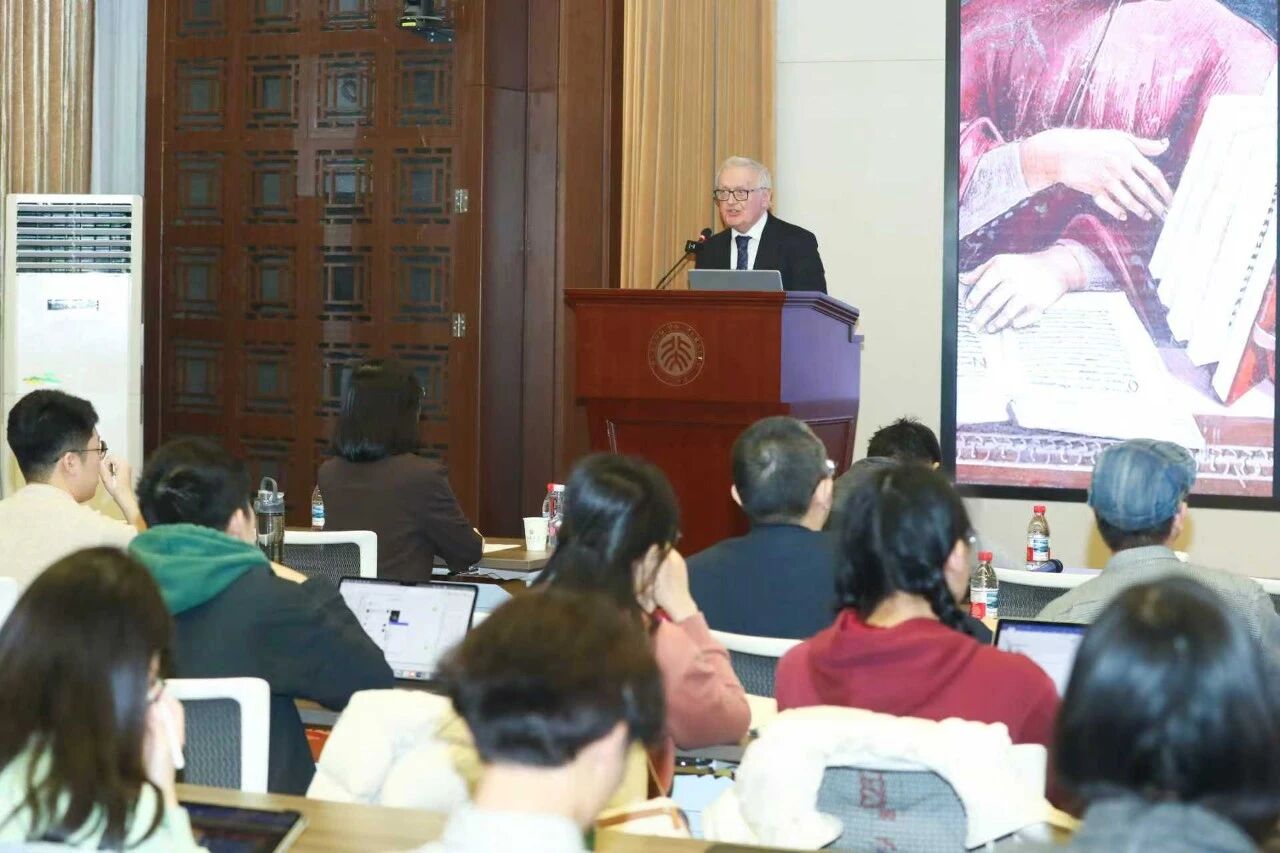
Professor Minnis Delivering the Concluding Lecture in the Series
During the discussion session, Professor Yun Ni from the Department of English observed that the lecture series unfolded as a progressively layered “narrative arc,” moving from medieval foundations to modern concerns and culminating in “our current crisis of meaning.” She illustrated this shift with John Wycliffe, showing how the seeds of a major intellectual transformation — from a theocentric worldview to human-centered self-awareness — emerged as early as the 14th century. Professor Ni then posed a probing question: “When literal meaning expands to encompass figurative meaning, what becomes of the roles of authority and mediation?” The question cut to the core of medieval hermeneutics and resonated with contemporary societal challenges. Following this, faculty and students raised thoughtful questions on topics ranging from re-examining “authenticity” in the AI era to Lionel Trilling’s classic analysis of the concept. Professor Minnis responded to complex questions by drawing connections across historical and contemporary contexts, clarifying intricate concepts in medieval thought, and prompting the audience to reconsider the relevance of these ideas today.
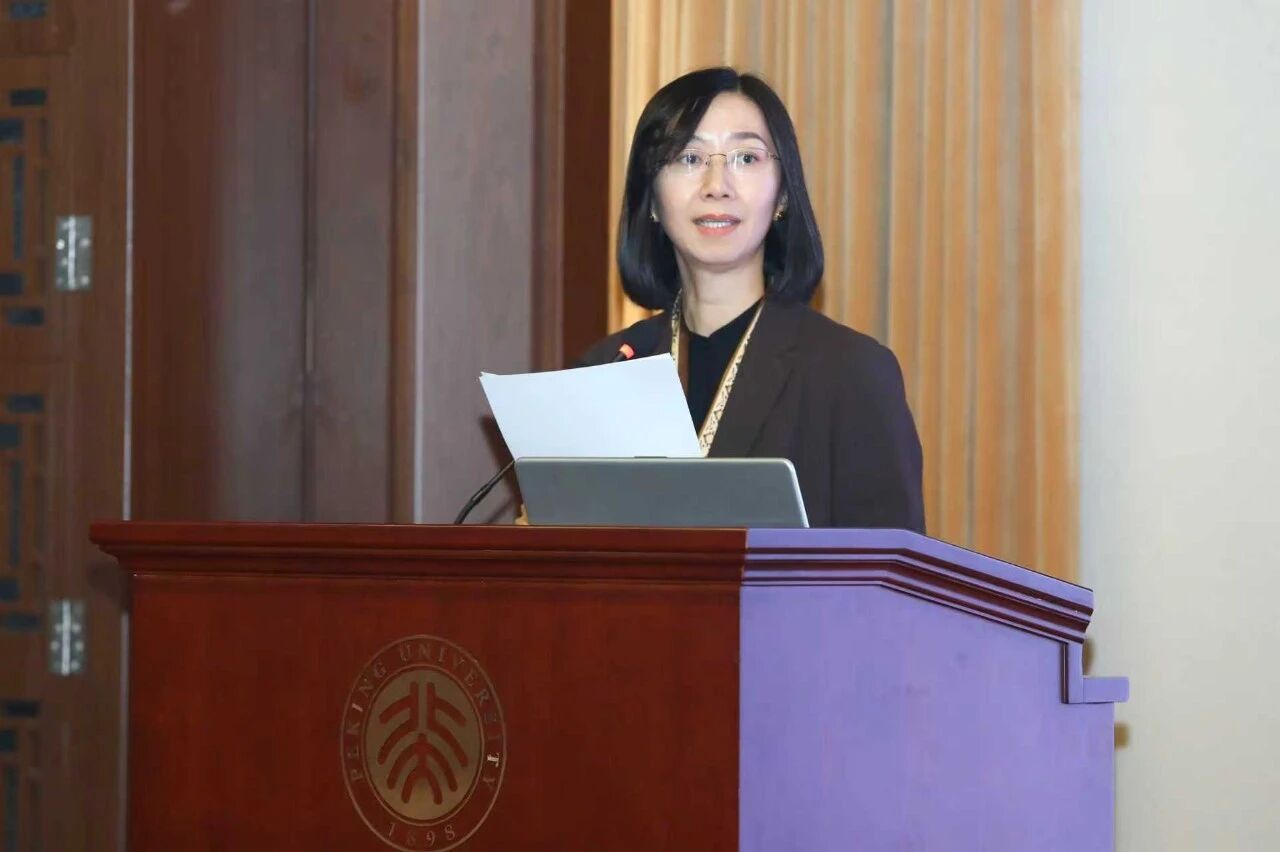
Professor Yun Ni, Discussant
Following the lectures, Professor Minnis conveyed his heartfelt gratitude for Peking University’s warm hospitality and lauded the university’s deep commitment to the humanities as well as the exceptional quality of its student training. He reflected that his visit had left a lasting impression and expressed keen anticipation for future academic dialogues with PKU faculty and students. He also affirmed his strong confidence in the innovative vitality and promising future of Chinese scholarship.
Professor Minnis’ visit went beyond a conventional academic exchange, serving as a dialogue of civilizations that strengthened ties between Yale University, Peking University, and Fudan University. Scholars from the three institutions shared knowledge and ideas, fostering an open, inclusive, and harmonious academic environment.
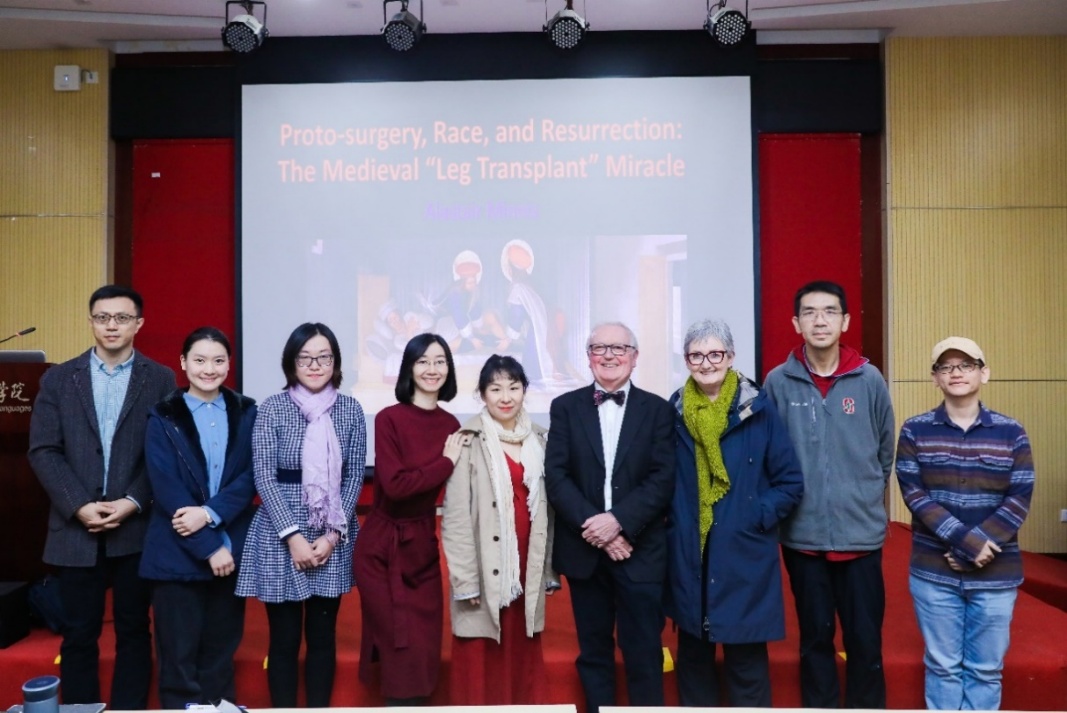
Professor Minnis with Professor Bao Huiyi and PKU English Department Faculty after the Lectures
Special thanks to the Office of International Relations at Peking University and Yale Center Beijing for their support of this event.
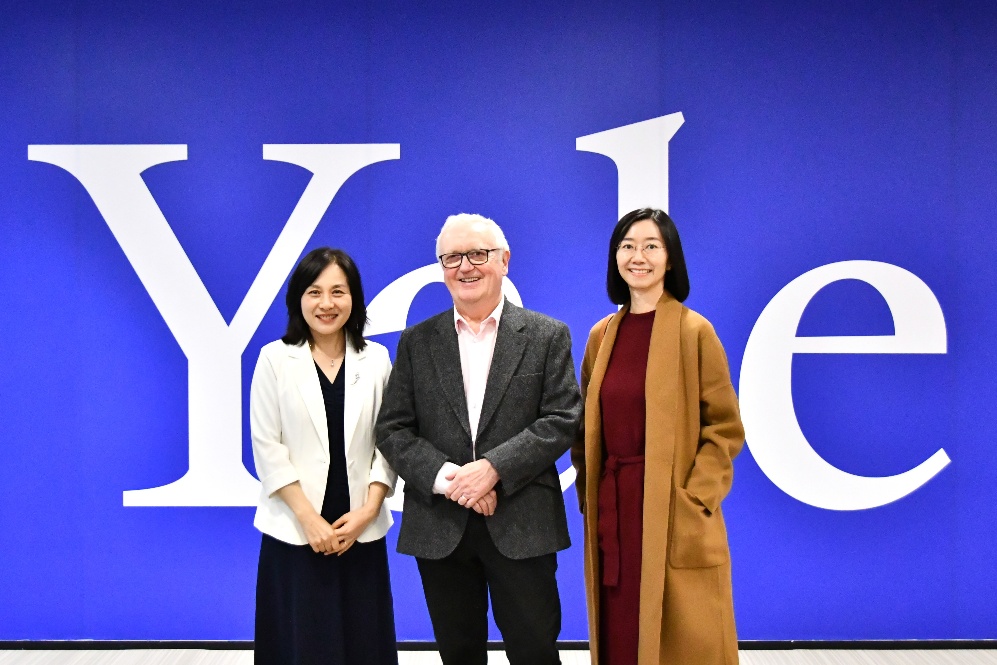
Professor Minnis and Professor Ni with Ms. Joyce Wang, Deputy Director of Yale Center Beijing
Text by Sizhe Qu; Edited by Yun Ni
Photos by Hanxiao Cao, Jingwen Huang, Xinfei Zhang (Yale Center Beijing)
